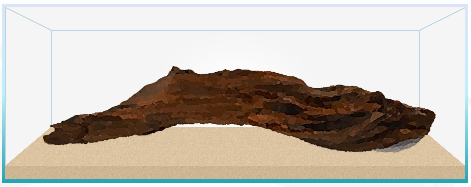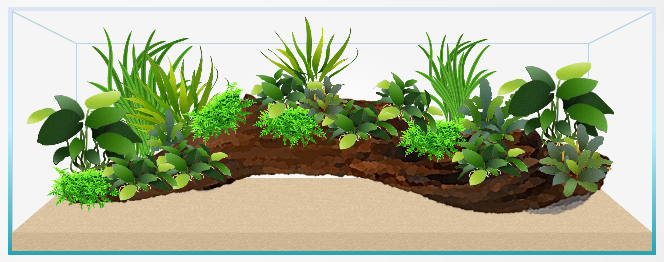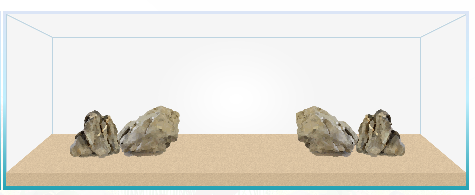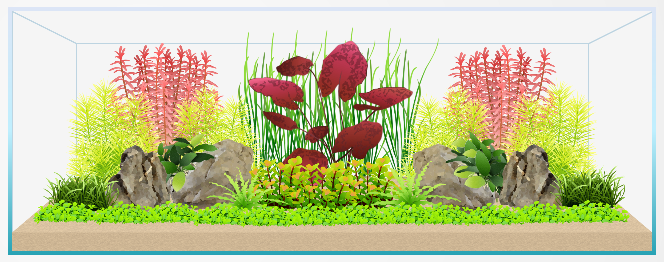Dutch Layouts
The Dutch approach to aquascaping is fundamentally based on the rapid growth of plants and their strategic arrangement within the aquarium. Plants are clustered together, enhancing one another through a variety of colors, shapes, and sizes. Typically, there are one to two red plants included in the aquarium, which serve as a focal point.
Layout One
Plant List
Difficulty: Hard
Layout Two
Plant ListDifficulty: Hard
Epiphyte Layouts
Using epiphyte plants, such as ferns, anubias, bucephalandra, and moss, to create beautiful aquascapes without the need for specialized substrates, intensive fertilization, or CO2 injection is the main goal of epiphyte layouts. Low lighting levels can be maintained to lessen the chance of algae growing.
Layout OneEquipment List
Tank Size: 80 x 40 x 30 cm tank
Lighting: 1500 Lumins (Medium)
Filtration: 380 lph
Fertilisation: Light
Co2: Not Needed
Substrate: 10KG sand
Hardscape: 1x Driftwood
Plant List
1x Microsorum Pteropus 'Narrow'
2x Microsorum Pteropus
1x Bucephalandra 'Wavy Green'
1x Vesicularia Dubyanana 'Christmas'
4x Anubias Barteri var. nana
2x Anubias Barteri var. Bareri
1x Bucephalandra sp. 'red'
Difficulty: Moderate
Plant Mass: Heavy
Layout Two
Plant ListDifficulty: Hard
Iwagumi Layouts
The tranquil and minimalist approach to aquascaping is well-known for its polarizing nature. While some individuals perceive the limited variety of plants, particularly stem plants, as restrictive, I personally find an Iwagumi layout to be refreshingly liberating. Generally utilizing just a handful of stones and a few species of low-growing, carpeting plants, its simplicity serves as an excellent enhancement to contemporary home interiors or to schooling fish that favor open water.
Layout One
Plant List
Difficulty: Medium
Layout Two
Plant ListDifficulty: Hard
Jungle Layouts
The Jungle Style aquascaping method is characterized by its wild and chaotic nature. It seeks to achieve a natural and unrestrained look, featuring a dense arrangement of plants. This type of planted aquarium is ideal for novices, as it demands minimal upkeep aside from weekly water changes and occasional pruning when needed.
Layout OneEquipment List
Tank Size: 80 x 40 x 30 cm tank
Lighting: 1900 Lumins (High)
Filtration: 380 lph
Fertilisation: Normal
Co2: Recommended
Substrate: 15KG sand
Hardscape: 16-20kg Seiryu Stone
Plant List
Background
4x Vallisneria nana (B)
2x Rotala Rotundifolia (B)
3x Pogostemon Erectus (B)
1x Nymphaea Lotus 'red' (B)
Midground
2x Anubias Barteri var. nana (M)
2x Rotala 'Bonsai' (M)
Foreground
1x Pogostemon helferi (F)
1x Lilaeopsis Brasiliensis (F)
6x Marsilea hirsuta (F/C)
Difficulty: Moderate
Plant Mass: Heavy
Layout Two
Plant ListDifficulty: Easy
River Layouts
The River aquascaping method emulates the bottom of a river. Such aquascapes feature elements like rocks, wood, and simple plants, including epiphytes that are either tied or glued to wood and/or rocks. Additionally, botanicals such as seed pods and leaves can be incorporated to enhance the natural appearance.
Layout One
Plant List
Difficulty: Easy
Layout Two
Plant ListDifficulty: Medium



